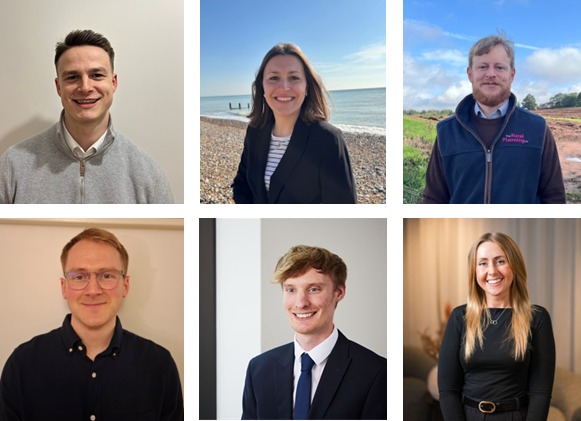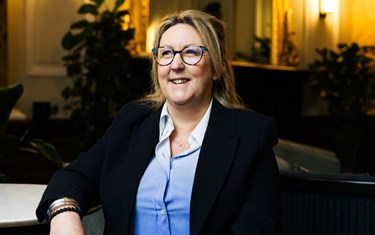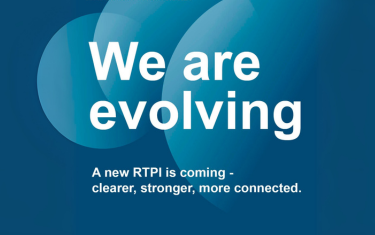Each year, the RTPI’s Membership Assessment Advisory Panel (MAAP) recognises commendable submissions, celebrating the hard work and outstanding quality of candidates. From the cohort of 2024, Adam Jones, Imogen Holgate, David Anderson, Matthew Spencer, Tom Wignall, and Megan Smith stood out for the quality of their submissions. Each candidate shared personal reflections on their journey to Chartership and why they believe becoming Chartered is a pivotal milestone in their planning careers. From career confidence to professional recognition, their experiences reveal why becoming Chartered is more than just a title – it shapes your planning future.

From top left, Tom, Megan, Adam, David, Matthew and Imogen
A moment of reflection and growth
For many, the Assessment of Professional Competence (APC) process is as much about self-reflection as it is about professional validation.
Adam Jones described Chartership as “an important milestone in my professional career,” adding that “whilst the APC process was a significant time commitment, it was a hugely reflective and beneficial experience.”
Megan Smith echoed this sentiment, highlighting the opportunity to “look back and reflect on how you have progressed as a planner across your career, understanding how your skills have evolved, recognising strengths, and identifying areas for growth.”
Why chartership is worth it
Megan also, listed three key reasons for why she would recommend becoming Chartered:
- Professional recognition – “widely recognised as a mark of professional competence and commitment, and that you have reached a particular level in your career”.
- Career growth – “the process of becoming Chartered requires dedication, critical reflection, and continuous professional development, which helps planners refine their expertise and grow in confidence”.
- Personal development – “both the process of becoming Chartered and being Chartered highlights key attributes such as motivation, resilience, and a proactive approach to career progression. For those in their early careers looking to establish themselves in the field, it is a valuable investment in their future success”.
Recognition that matters
Imogen Holgate outlined the professional recognition she feels she received from gaining Chartered membership. “It was the acknowledgment and confidence boost that Chartership brings” she explained. “Doing my A-APC and then becoming Chartered was incredibly rewarding and not only showed others in the industry, but also myself, that I have indeed acquired a high level of knowledge, skills and experience. Chartership means that I no longer feel a step behind my peers”.
Her advice to others, “I would recommend undertaking the APC process and becoming Chartered. I would say to anyone not to be put off if you cannot pursue the Licentiate route, there are other routes to Chartership and whist they will be longer and seem more daunting, they will be worth it.”
Developing Professional Confidence
Matthew Spencer began working towards Chartership from day one of his graduate scheme at Newmark, seeing it as a key early milestone.
The APC process, he said, “helped me reflect on the role of a planner, and the roles of other built environment professionals, increased my commercial awareness and understanding of the political and socio-economic impacts of my work. I found my pragmatism towards complex planning issues also increased helping to develop my leadership skills on projects.”
His advice, “I would recommend becoming Chartered, the process is well established and there is plenty of support throughout. It will help you to gain knowledge on the profession and it is well recognised by employers, clients, and members of the public.”
Exploring New Paths and Future growth
David Anderson views Chartership as a valuable opportunity for structured reflection and planning the next steps in his career. “Becoming Chartered also demonstrates to others that you adhere to the high professional standards required and that you have accumulated valuable experience.” he said. “It’s not essential for all planning roles but if you are still trying to find the area you might be interested in specialising in, it will certainly keep lots of options open.”
He also found it useful for identifying knowledge gaps and shaping future goals: “It enables you to gauge where your experience has been focused and what areas of the profession you have yet to encounter in depth.”
For Tom Wignall, Chartership marked the first significant milestone in his planning career. Professionally, it provided “international recognition of my competency as a planner.”
Reflecting on his journey helped him identify areas for development, including gaining more experience in the residential planning sector with Avison Young. Tom sees Chartership as a gateway to senior roles and a wide range of opportunities across the sector. “Regardless of what sector you are currently employed in, becoming Chartered offers you the freedom to explore a wide variety of opportunities across different organisations, agencies, and public bodies”, he said.
Inspired to take the next step?
The stories of Adam, Imogen, David, Matthew, Tom, Megan, highlight just how transformative becoming Chartered can be – both professionally and personally
Whether you’re early in your career or well-established, pursuing Chartership is a powerful step toward excellence, credibility, and opportunity.
Ready to start your journey?
- Explore the different APC routes
- See top APC tips from all our commended candidates
Don’t forget the RTPI also offers free webinars throughout the year to support candidates preparing their submissions. They are a great opportunity to find out more about the requirements of the APC, learn some top tips and to ask questions. Check out the events calendar to find one that suits you and book your place.
For more information about becoming Chartered and to understand which route is best for you, please feel free to contact the Membership team, who will be happy to help: [email protected] or call 0370 774 9494.


